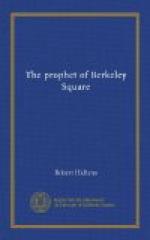The Prophet blinked with amazement, like a martyr who suddenly finds himself snatched from the rack and laid upon a plush divan with a satin cushion under his head.
“I’m going to trust you,” Lady Enid went on, emphasising the two pronouns.
“Many thanks,” said the Prophet, unoriginally.
She was sitting on a square piece of furniture which the Marquis of Glome called an “Aberdeen lean-to.” She now spread herself out upon it in the easy attitude of one who is about to converse intimately for some centuries, and proceeded.
“I daresay you know, Mr. Vivian, that people always call me a very sensible sort of girl.”
The Prophet remembered his grandmother’s remark about Lady Enid.
“I know they do,” he assented, trying not to think of five o’clock.
“What do they mean by that, Mr. Vivian?”
“I beg your pardon?”
“I say what do they mean by a sensible sort of girl?”
“Why, I suppose—”
“I’m going to tell you,” she interrupted him. “They mean a sort of girl who likes fresh air, washes her face with yellow soap, sports dogskin gloves, drives in an open cart in preference to a shut brougham, enjoys a cold tub and Whyte Melville’s novels, laughs at ghosts and cries over ‘Misunderstood,’ considers the Bishop of London a deity and the Albert Memorial a gem of art, would wear a neat Royal fringe in her grave, and a straw hat and shirt on the Judgment Day if she were in the country for it—walks with the guns, sings ‘Home, Sweet Home’ in the evening after dinner to her bald-headed father, thinks the Daily Mail an intellectual paper, the Royal Academy an uplifting institution, the British officer a demi-god with a heart of gold in a body of steel, and the road from Calais to Paris the way to heaven. That’s what they mean by a sensible sort of girl, isn’t it?”
“I daresay it is,” said the Prophet, endeavouring not to feel as if he were sitting with a dozen or two of very practised stump orators.
“Yes, and that’s what they think I am.”
“And aren’t you?” inquired the Prophet.
Lady Enid drew herself upon the Aberdeen lean-to.
“No,” she said decisively, “I’m not. I’m a Miss Minerva Partridge.”
“Well, but what is that?” asked the Prophet, with all the air of a man inquiring about some savage race.
“That’s the secret—”
“Oh, I beg your pardon!”
“That I’m going to tell you now, because I trust you—”
Again the pronouns were emphasised, and the Prophet thought how difficult it would be to keep his oath.
“And because I know now that you’re silly too.”
The Prophet jumped, though not for joy.
“I’ve been Miss Minerva Partridge for—wait a moment, I must look.”
She got up, went to a writing table, opened a drawer in it, and took out a large red book and turned its leaves.




